PSYCH 6: Kohlberg's Stages of Moral Development and its Implications
VerifiedAdded on 2022/10/01
|6
|1288
|25
Essay
AI Summary
This essay delves into Lawrence Kohlberg's theory of moral development, a framework that outlines the progression of moral reasoning through distinct stages. The essay begins by introducing Kohlberg's work, which builds upon Jean Piaget's cognitive theory, and acknowledges the criticisms surrounding its potential biases. It then elaborates on the three main levels of moral development: pre-conventional, conventional, and post-conventional, explaining the key characteristics and influences at each stage. The essay highlights the significance of morality in human behavior, emphasizing its role in distinguishing between right and wrong and promoting ethical conduct. It also discusses Kohlberg's use of moral dilemmas to illustrate the application of these stages, providing an example involving a trolley problem to showcase the complexities of moral decision-making. The essay draws comparisons between Kohlberg's theory and religious teachings, particularly in the context of social justice and the consideration of others' interests. Finally, the essay acknowledges the adaptive nature of moral sense, emphasizing that moral reasoning is context-dependent and not rigid. The essay concludes with a summary of the key concepts and implications of Kohlberg's theory.
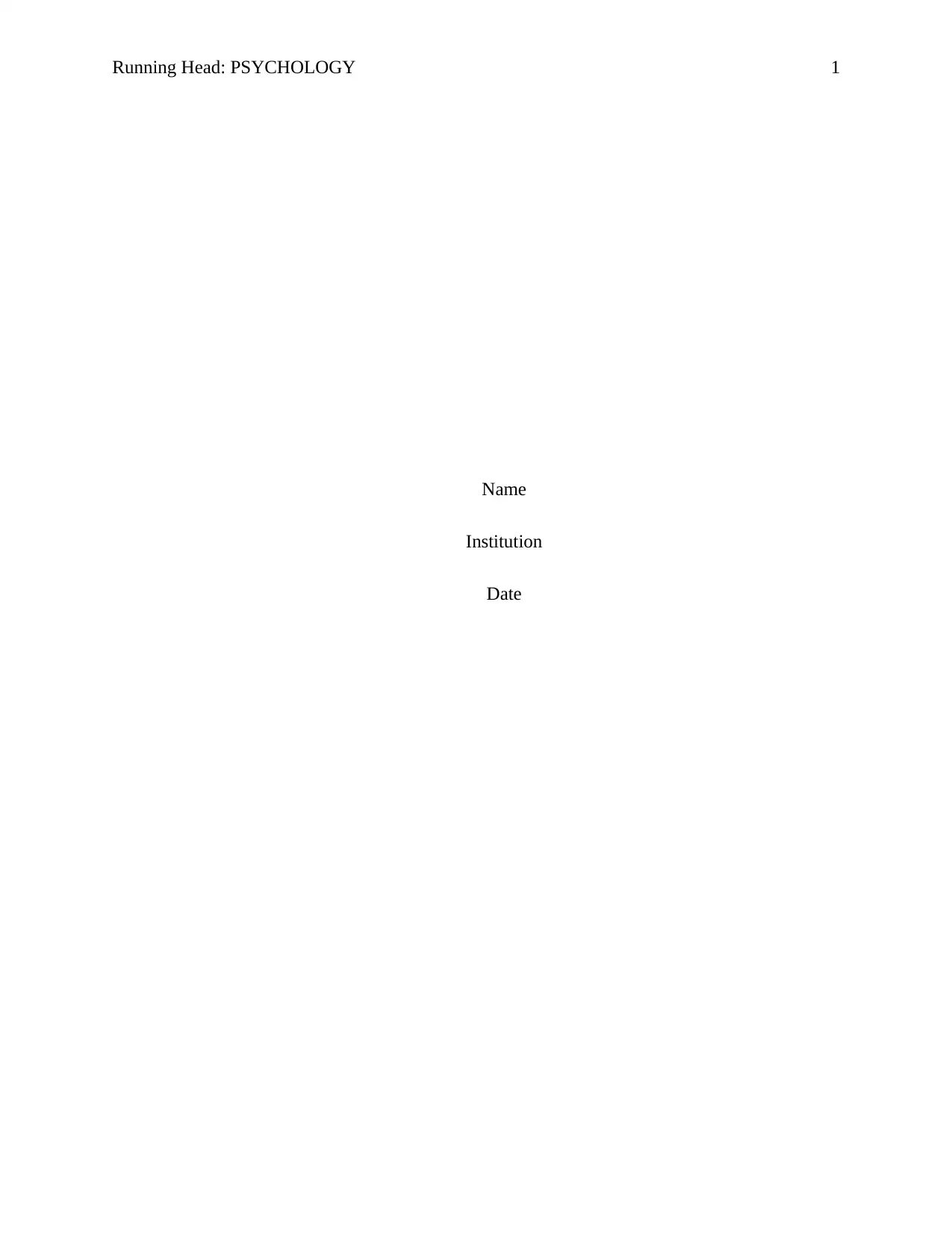
Running Head: PSYCHOLOGY 1
Name
Institution
Date
Name
Institution
Date
Paraphrase This Document
Need a fresh take? Get an instant paraphrase of this document with our AI Paraphraser
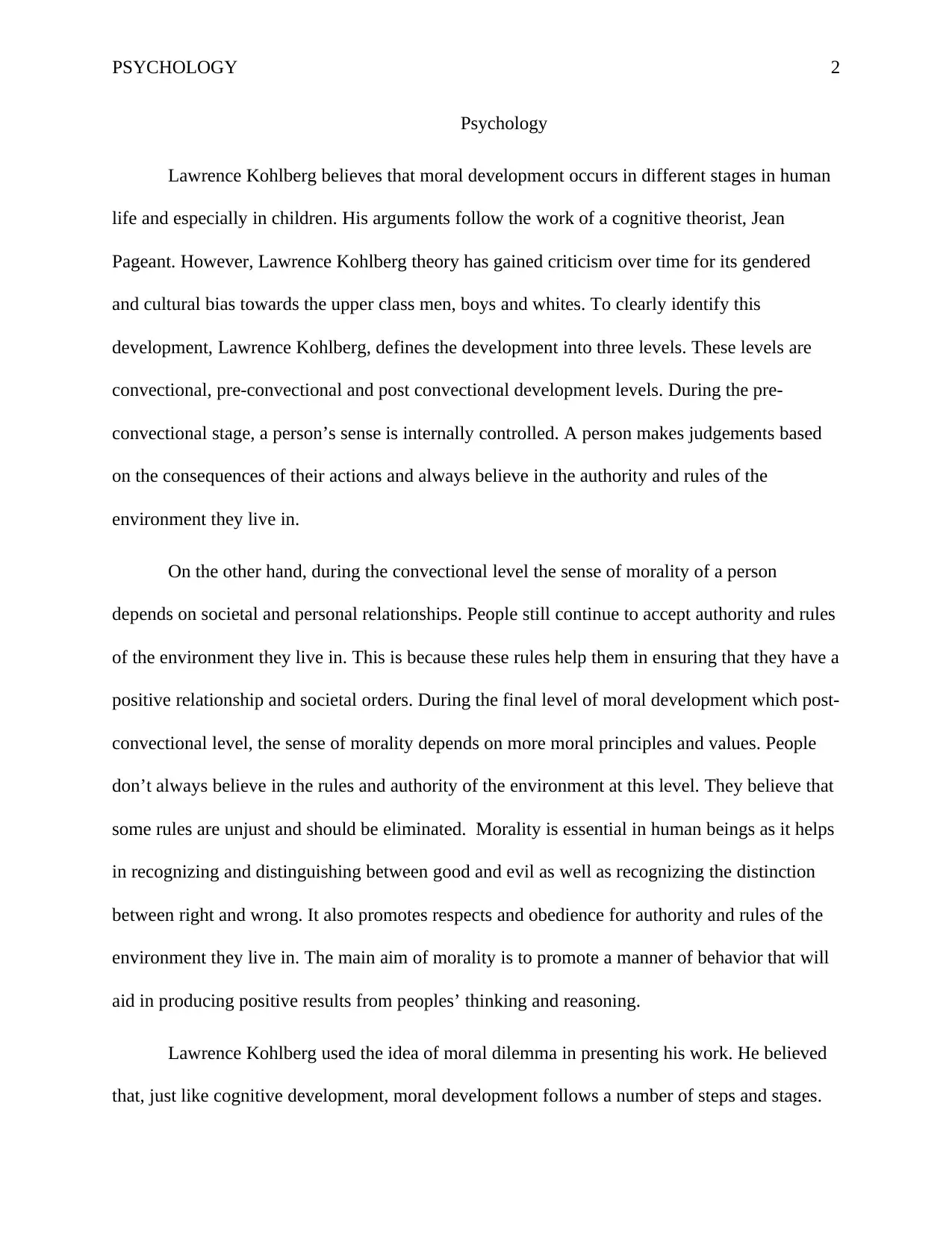
PSYCHOLOGY 2
Psychology
Lawrence Kohlberg believes that moral development occurs in different stages in human
life and especially in children. His arguments follow the work of a cognitive theorist, Jean
Pageant. However, Lawrence Kohlberg theory has gained criticism over time for its gendered
and cultural bias towards the upper class men, boys and whites. To clearly identify this
development, Lawrence Kohlberg, defines the development into three levels. These levels are
convectional, pre-convectional and post convectional development levels. During the pre-
convectional stage, a person’s sense is internally controlled. A person makes judgements based
on the consequences of their actions and always believe in the authority and rules of the
environment they live in.
On the other hand, during the convectional level the sense of morality of a person
depends on societal and personal relationships. People still continue to accept authority and rules
of the environment they live in. This is because these rules help them in ensuring that they have a
positive relationship and societal orders. During the final level of moral development which post-
convectional level, the sense of morality depends on more moral principles and values. People
don’t always believe in the rules and authority of the environment at this level. They believe that
some rules are unjust and should be eliminated. Morality is essential in human beings as it helps
in recognizing and distinguishing between good and evil as well as recognizing the distinction
between right and wrong. It also promotes respects and obedience for authority and rules of the
environment they live in. The main aim of morality is to promote a manner of behavior that will
aid in producing positive results from peoples’ thinking and reasoning.
Lawrence Kohlberg used the idea of moral dilemma in presenting his work. He believed
that, just like cognitive development, moral development follows a number of steps and stages.
Psychology
Lawrence Kohlberg believes that moral development occurs in different stages in human
life and especially in children. His arguments follow the work of a cognitive theorist, Jean
Pageant. However, Lawrence Kohlberg theory has gained criticism over time for its gendered
and cultural bias towards the upper class men, boys and whites. To clearly identify this
development, Lawrence Kohlberg, defines the development into three levels. These levels are
convectional, pre-convectional and post convectional development levels. During the pre-
convectional stage, a person’s sense is internally controlled. A person makes judgements based
on the consequences of their actions and always believe in the authority and rules of the
environment they live in.
On the other hand, during the convectional level the sense of morality of a person
depends on societal and personal relationships. People still continue to accept authority and rules
of the environment they live in. This is because these rules help them in ensuring that they have a
positive relationship and societal orders. During the final level of moral development which post-
convectional level, the sense of morality depends on more moral principles and values. People
don’t always believe in the rules and authority of the environment at this level. They believe that
some rules are unjust and should be eliminated. Morality is essential in human beings as it helps
in recognizing and distinguishing between good and evil as well as recognizing the distinction
between right and wrong. It also promotes respects and obedience for authority and rules of the
environment they live in. The main aim of morality is to promote a manner of behavior that will
aid in producing positive results from peoples’ thinking and reasoning.
Lawrence Kohlberg used the idea of moral dilemma in presenting his work. He believed
that, just like cognitive development, moral development follows a number of steps and stages.
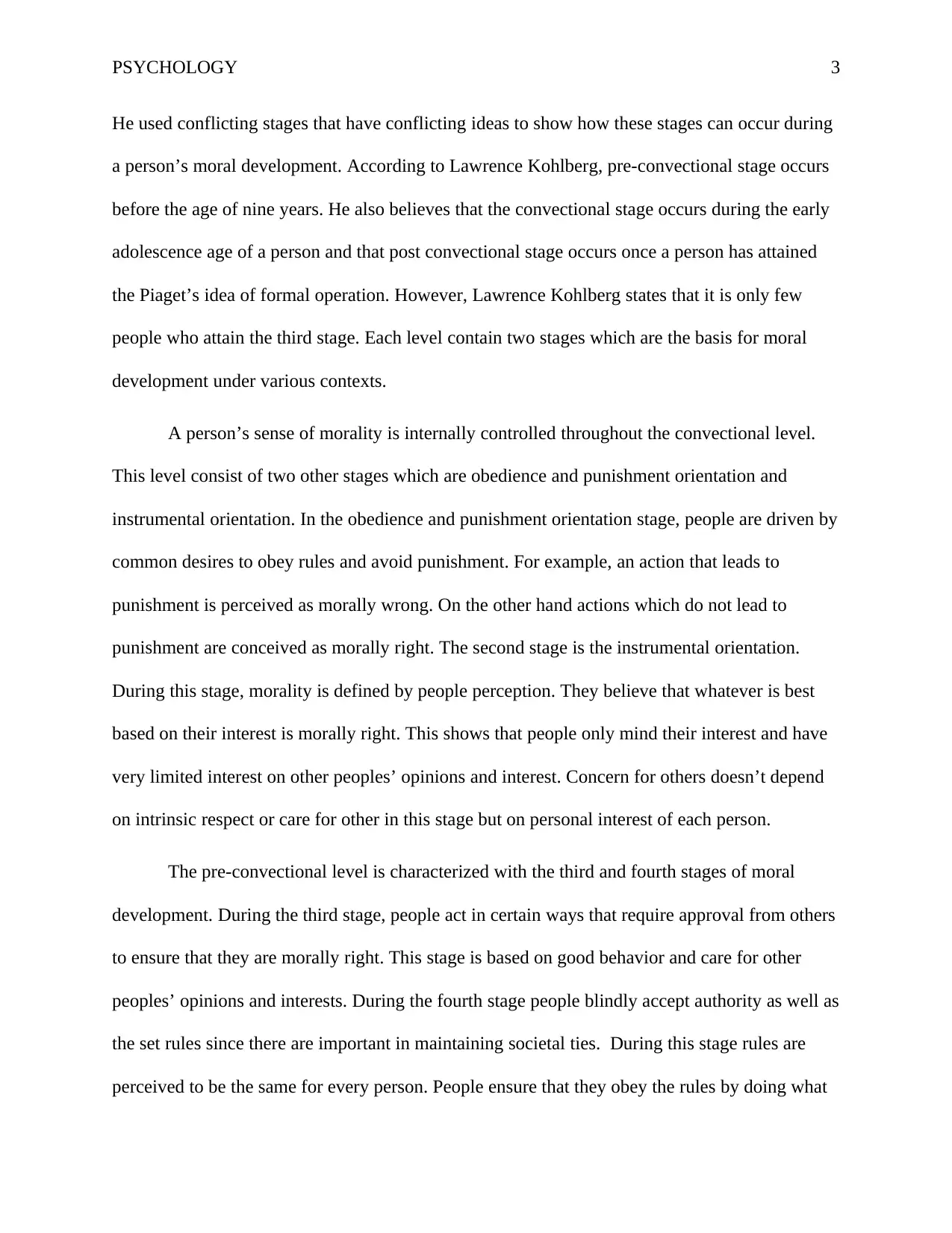
PSYCHOLOGY 3
He used conflicting stages that have conflicting ideas to show how these stages can occur during
a person’s moral development. According to Lawrence Kohlberg, pre-convectional stage occurs
before the age of nine years. He also believes that the convectional stage occurs during the early
adolescence age of a person and that post convectional stage occurs once a person has attained
the Piaget’s idea of formal operation. However, Lawrence Kohlberg states that it is only few
people who attain the third stage. Each level contain two stages which are the basis for moral
development under various contexts.
A person’s sense of morality is internally controlled throughout the convectional level.
This level consist of two other stages which are obedience and punishment orientation and
instrumental orientation. In the obedience and punishment orientation stage, people are driven by
common desires to obey rules and avoid punishment. For example, an action that leads to
punishment is perceived as morally wrong. On the other hand actions which do not lead to
punishment are conceived as morally right. The second stage is the instrumental orientation.
During this stage, morality is defined by people perception. They believe that whatever is best
based on their interest is morally right. This shows that people only mind their interest and have
very limited interest on other peoples’ opinions and interest. Concern for others doesn’t depend
on intrinsic respect or care for other in this stage but on personal interest of each person.
The pre-convectional level is characterized with the third and fourth stages of moral
development. During the third stage, people act in certain ways that require approval from others
to ensure that they are morally right. This stage is based on good behavior and care for other
peoples’ opinions and interests. During the fourth stage people blindly accept authority as well as
the set rules since there are important in maintaining societal ties. During this stage rules are
perceived to be the same for every person. People ensure that they obey the rules by doing what
He used conflicting stages that have conflicting ideas to show how these stages can occur during
a person’s moral development. According to Lawrence Kohlberg, pre-convectional stage occurs
before the age of nine years. He also believes that the convectional stage occurs during the early
adolescence age of a person and that post convectional stage occurs once a person has attained
the Piaget’s idea of formal operation. However, Lawrence Kohlberg states that it is only few
people who attain the third stage. Each level contain two stages which are the basis for moral
development under various contexts.
A person’s sense of morality is internally controlled throughout the convectional level.
This level consist of two other stages which are obedience and punishment orientation and
instrumental orientation. In the obedience and punishment orientation stage, people are driven by
common desires to obey rules and avoid punishment. For example, an action that leads to
punishment is perceived as morally wrong. On the other hand actions which do not lead to
punishment are conceived as morally right. The second stage is the instrumental orientation.
During this stage, morality is defined by people perception. They believe that whatever is best
based on their interest is morally right. This shows that people only mind their interest and have
very limited interest on other peoples’ opinions and interest. Concern for others doesn’t depend
on intrinsic respect or care for other in this stage but on personal interest of each person.
The pre-convectional level is characterized with the third and fourth stages of moral
development. During the third stage, people act in certain ways that require approval from others
to ensure that they are morally right. This stage is based on good behavior and care for other
peoples’ opinions and interests. During the fourth stage people blindly accept authority as well as
the set rules since there are important in maintaining societal ties. During this stage rules are
perceived to be the same for every person. People ensure that they obey the rules by doing what
⊘ This is a preview!⊘
Do you want full access?
Subscribe today to unlock all pages.

Trusted by 1+ million students worldwide
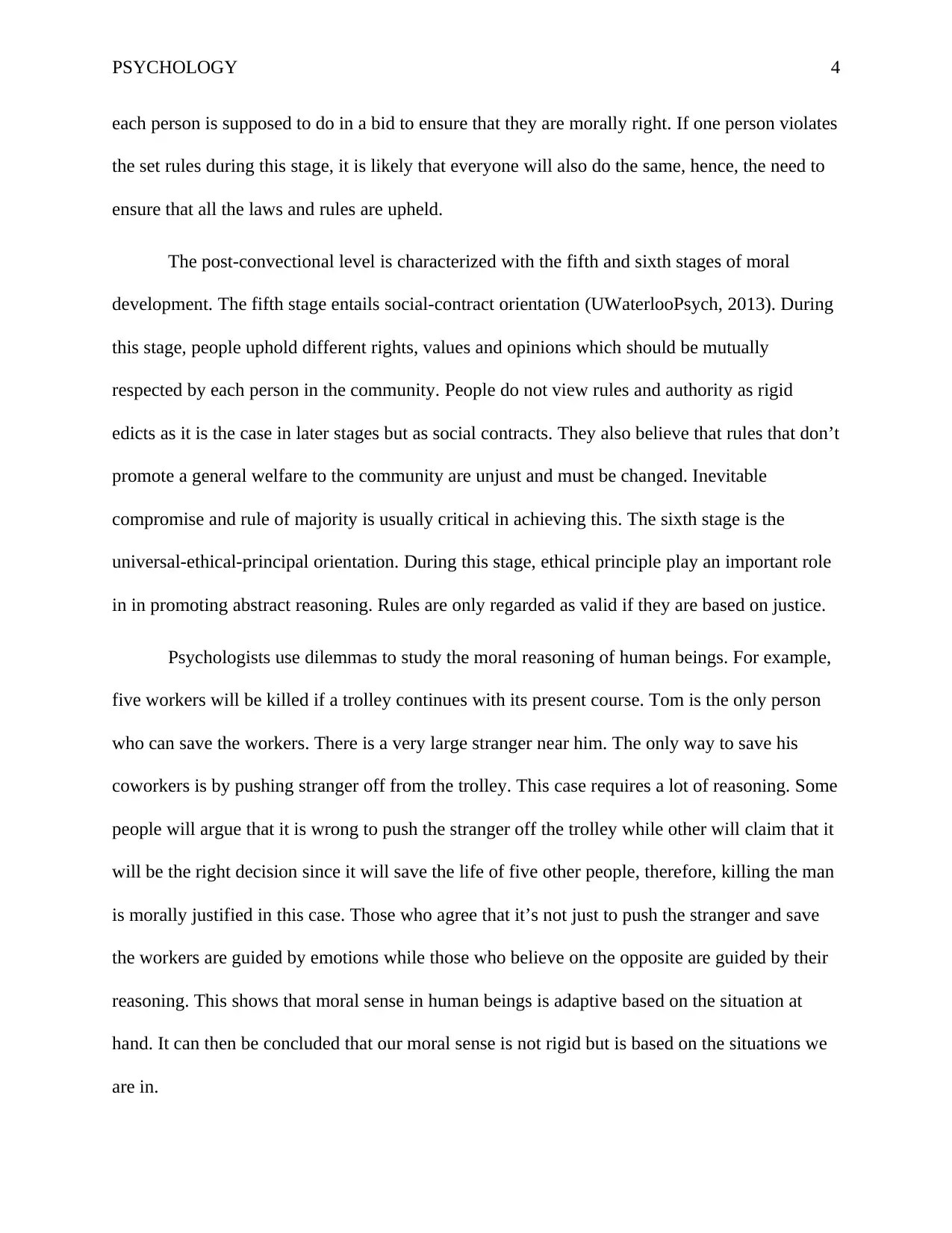
PSYCHOLOGY 4
each person is supposed to do in a bid to ensure that they are morally right. If one person violates
the set rules during this stage, it is likely that everyone will also do the same, hence, the need to
ensure that all the laws and rules are upheld.
The post-convectional level is characterized with the fifth and sixth stages of moral
development. The fifth stage entails social-contract orientation (UWaterlooPsych, 2013). During
this stage, people uphold different rights, values and opinions which should be mutually
respected by each person in the community. People do not view rules and authority as rigid
edicts as it is the case in later stages but as social contracts. They also believe that rules that don’t
promote a general welfare to the community are unjust and must be changed. Inevitable
compromise and rule of majority is usually critical in achieving this. The sixth stage is the
universal-ethical-principal orientation. During this stage, ethical principle play an important role
in in promoting abstract reasoning. Rules are only regarded as valid if they are based on justice.
Psychologists use dilemmas to study the moral reasoning of human beings. For example,
five workers will be killed if a trolley continues with its present course. Tom is the only person
who can save the workers. There is a very large stranger near him. The only way to save his
coworkers is by pushing stranger off from the trolley. This case requires a lot of reasoning. Some
people will argue that it is wrong to push the stranger off the trolley while other will claim that it
will be the right decision since it will save the life of five other people, therefore, killing the man
is morally justified in this case. Those who agree that it’s not just to push the stranger and save
the workers are guided by emotions while those who believe on the opposite are guided by their
reasoning. This shows that moral sense in human beings is adaptive based on the situation at
hand. It can then be concluded that our moral sense is not rigid but is based on the situations we
are in.
each person is supposed to do in a bid to ensure that they are morally right. If one person violates
the set rules during this stage, it is likely that everyone will also do the same, hence, the need to
ensure that all the laws and rules are upheld.
The post-convectional level is characterized with the fifth and sixth stages of moral
development. The fifth stage entails social-contract orientation (UWaterlooPsych, 2013). During
this stage, people uphold different rights, values and opinions which should be mutually
respected by each person in the community. People do not view rules and authority as rigid
edicts as it is the case in later stages but as social contracts. They also believe that rules that don’t
promote a general welfare to the community are unjust and must be changed. Inevitable
compromise and rule of majority is usually critical in achieving this. The sixth stage is the
universal-ethical-principal orientation. During this stage, ethical principle play an important role
in in promoting abstract reasoning. Rules are only regarded as valid if they are based on justice.
Psychologists use dilemmas to study the moral reasoning of human beings. For example,
five workers will be killed if a trolley continues with its present course. Tom is the only person
who can save the workers. There is a very large stranger near him. The only way to save his
coworkers is by pushing stranger off from the trolley. This case requires a lot of reasoning. Some
people will argue that it is wrong to push the stranger off the trolley while other will claim that it
will be the right decision since it will save the life of five other people, therefore, killing the man
is morally justified in this case. Those who agree that it’s not just to push the stranger and save
the workers are guided by emotions while those who believe on the opposite are guided by their
reasoning. This shows that moral sense in human beings is adaptive based on the situation at
hand. It can then be concluded that our moral sense is not rigid but is based on the situations we
are in.
Paraphrase This Document
Need a fresh take? Get an instant paraphrase of this document with our AI Paraphraser
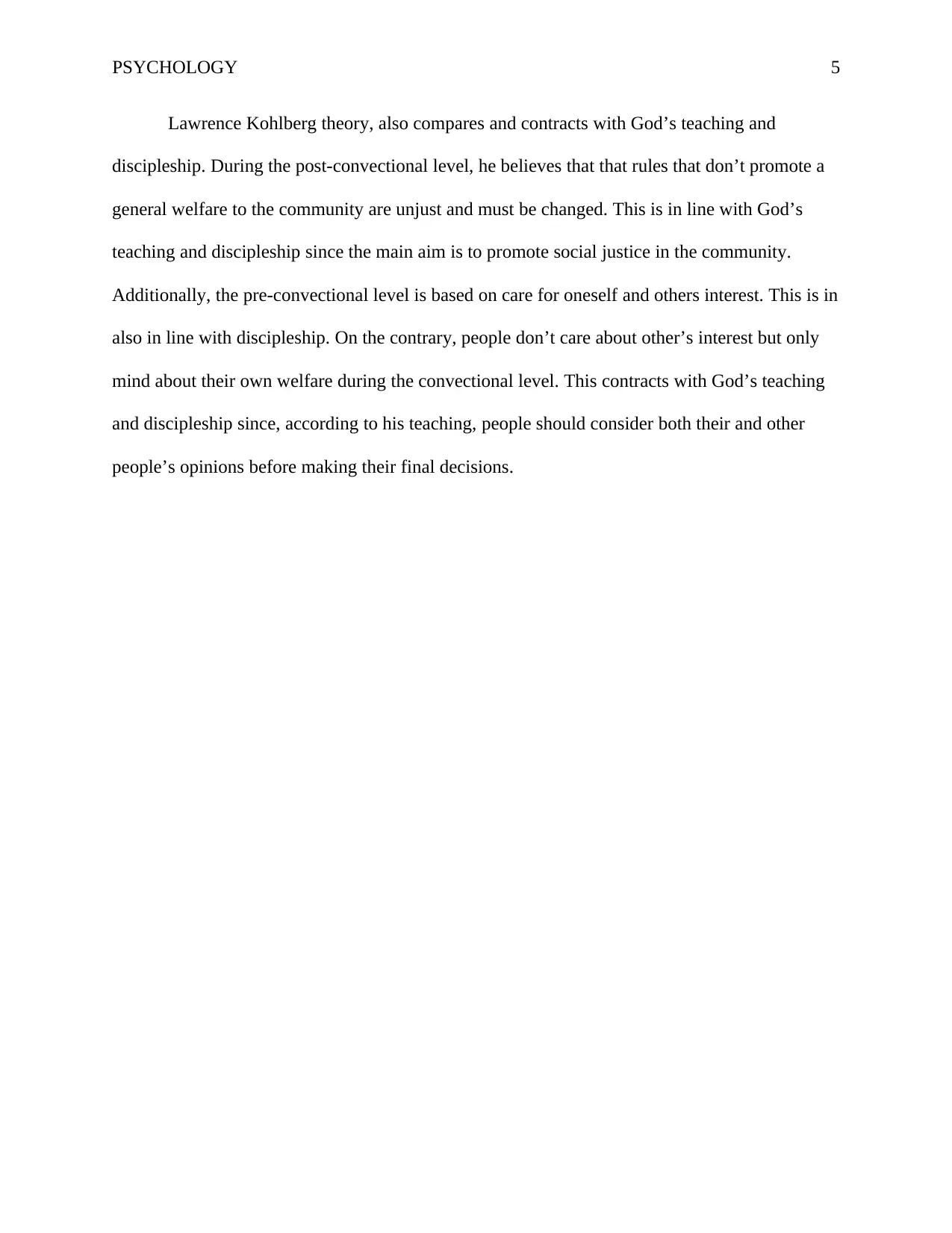
PSYCHOLOGY 5
Lawrence Kohlberg theory, also compares and contracts with God’s teaching and
discipleship. During the post-convectional level, he believes that that rules that don’t promote a
general welfare to the community are unjust and must be changed. This is in line with God’s
teaching and discipleship since the main aim is to promote social justice in the community.
Additionally, the pre-convectional level is based on care for oneself and others interest. This is in
also in line with discipleship. On the contrary, people don’t care about other’s interest but only
mind about their own welfare during the convectional level. This contracts with God’s teaching
and discipleship since, according to his teaching, people should consider both their and other
people’s opinions before making their final decisions.
Lawrence Kohlberg theory, also compares and contracts with God’s teaching and
discipleship. During the post-convectional level, he believes that that rules that don’t promote a
general welfare to the community are unjust and must be changed. This is in line with God’s
teaching and discipleship since the main aim is to promote social justice in the community.
Additionally, the pre-convectional level is based on care for oneself and others interest. This is in
also in line with discipleship. On the contrary, people don’t care about other’s interest but only
mind about their own welfare during the convectional level. This contracts with God’s teaching
and discipleship since, according to his teaching, people should consider both their and other
people’s opinions before making their final decisions.

PSYCHOLOGY 6
References
UWaterlooPsych. (2013). Lawrence Kohlberg Psychologist of Morality. Retrieved from:
https://youtu.be/Wm34XKECHNM
References
UWaterlooPsych. (2013). Lawrence Kohlberg Psychologist of Morality. Retrieved from:
https://youtu.be/Wm34XKECHNM
⊘ This is a preview!⊘
Do you want full access?
Subscribe today to unlock all pages.

Trusted by 1+ million students worldwide
1 out of 6
Related Documents
Your All-in-One AI-Powered Toolkit for Academic Success.
+13062052269
info@desklib.com
Available 24*7 on WhatsApp / Email
![[object Object]](/_next/static/media/star-bottom.7253800d.svg)
Unlock your academic potential
Copyright © 2020–2026 A2Z Services. All Rights Reserved. Developed and managed by ZUCOL.





